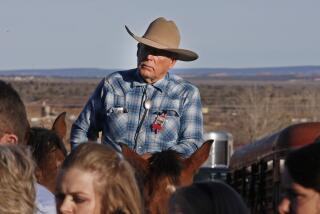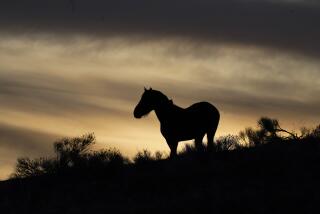Controversial roundup of wild horses underway
- Share via
A controversial roundup of 2,500 wild horses from public and private lands in Nevada began on Monday amid protests from activists who call it needless and inhumane.
Contractors in helicopters and on horseback herded some of the mustangs into corrals in the Black Rock Range, a chain of mountains 100 miles north of Reno, according to a spokeswoman for the Bureau of Land Management. Heather Emmons said she did not know how many horses were captured on the first day of the roundup, which will take two months and stretch across 1,750 square miles in the Calico Mountains Complex.
The BLM said the capture is necessary because the area cannot support its estimated 3,000 horses. The population must be reduced to protect the horses and the environment, the agency said.
Animal activists dispute that assessment, saying that the horses are healthy and that cattle and other grazing livestock do more damage.
The roundup, they say, will frighten the horses and could injure or even kill many of them.
“It’s a brutal process no matter how they do it,” activist Elyse Gardner said. “Legs get broken, horses get sick, foals can’t keep up and get separated from their mothers.”
Horses with broken legs typically are euthanized.
Gardner, who monitored a BLM roundup on the Pryor Mountain Wild Horse Range in Montana last summer, said she was alarmed that Monday’s capture was held on private land, where the public could not watch.
The BLM’s Emmons said the agency began the roundup there because it offered the best access to the animals. She said she expected the agency to work on private land for the next two weeks, or until it had captured about 250 mustangs, then move west.
Once the horses are captured, they will be trucked to Fallon, Nev., for veterinary care, Emmons said. Some horses will be offered for adoption. The rest will be transferred to pastures in the Midwest.
By law, they cannot be sent to slaughter.
More than 30,000 wild mustangs are already in captivity, and adopting them out has not been easy. Interior Secretary Ken Salazar has said the U.S. has spent $50 million on its wild horse program this year.
An animal rights group, In Defense of Animals, sued to try to prevent the roundup, contending that the mustangs are vital to the ecosystem. A federal judge rejected its request for an injunction last week.
A group of celebrities, including singer Sheryl Crow and actor Viggo Mortensen, objected to the roundup in an open letter to President Obama and Senate Majority Leader Harry Reid (D-Nev.) last week.
Obama has had no comment, but a spokesman for Reid said Monday that the senator was disappointed with the BLM’s handling of the horses.
“The BLM has failed to properly manage these herds for many years, requiring the large gather,” said Jon Summers, Reid’s spokesman.
In 1971, Congress passed the Wild Free-Roaming Horse and Burro Act, granting federal protection to wild horses and burros as “living symbols of the historic and pioneer spirit of the West.” The horses were introduced to North America by the Spanish conquistadors. Some of today’s wild mustangs are descendants of escaped Spanish horses.
The BLM estimates that half of the nation’s more than 36,000 wild horses live in Nevada, where the state quarter features galloping wild stallions.
More to Read
Sign up for Essential California
The most important California stories and recommendations in your inbox every morning.
You may occasionally receive promotional content from the Los Angeles Times.











